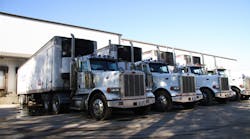Several national and state trucking groups are objecting to proposed legislation that they say would, in effect, bar the operation of new diesel-powered vehicles in the District of Columbia after 2017. A provision in the Sustainable D.C. Omnibus Act of 2013 (B20-0573) would ban the registration of new diesel-powered vehicles – trucks, buses, automobiles and fire trucks after that year. The legislation, which was introduced last month, is the cornerstone of Mayor Vincent Gray’s Sustainable DC plan.
In a Dec. 4 letter to D.C. Council Chairman Phil Mendelson the groups – the American Trucking Assns., the American Moving and Storage Assn., Truck Renting and Leasing Assn., Maryland Motor Truck Assn. and Virginia Trucking Assn. – said that the legislation apparently would do more than just ban the registration and operation of new diesel vehicles based in the city. Rather, it would bar the operation of any new diesel vehicle registered in any state or province under the International Registration Plan – in effect, any interstate truck or tractor over 26,000 lbs. gross weight.
“Although many motor carriers are considering whether natural gas or other alternative fuels are suitable for their operations, it will be many years – far longer than 2018 – before a significant portion of the commercial vehicle population of this country will be other than diesel vehicles,” the groups told Mendelson.
Given the typical four-year replacement cycle, a majority of trucks operated by motor carriers could be barred from D.C. as early as 2020, the groups said. “We believe that this result, which was presumably unintended by those drafting the legislation, would have an extraordinarily disruptive effect on the delivery of most freight into the city and that such a restriction may violate federal statute as well.”
Another unintended consequence of the legislation is that the older trucks that could continue operating in D.C. after 2017 likely would be less environmentally friendly and, arguably, less safe because carriers are increasingly able to incorporate advanced technologies such as lane departure warning and anti-rollover, the groups told Mendelson.
“We recommend that the District rely instead on market forces and federal regulations to improve the environmental friendliness of the diesel fleet, and use targeted incentives – as indeed other provisions of the act embody – where necessary,” the groups said.
“We’re very concerned that this provision, which is unnecessary to achieve the goals of the overall bill, would have a number of adverse effects on the residents and businesses in our nation’s capital,” said Bob Pitcher, ATA vice president of state laws. “If enacted as written, there will be serious disruptions to the supply chain for D.C. – which receives the vast majority of its goods via truck.”
Unintended consequences go beyond less clean, less safe equipment, Pitcher said. “Shippers may also choose to receive smaller, more frequent deliveries in smaller gasoline-powered vehicles – many, many gasoline-powered vehicles to add to one of the nation’s already most congested cities.”
Over time, carriers might steer clear of D.C. altogether, benefitting the economies of Maryland and Virginia at the expense of the district, Pitcher said.



